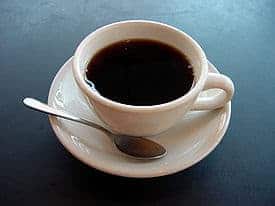Modest daily consumption of caffeinated drinks is associated with less advanced liver scarring in people with hepatitis C, according to a recent study by Baylor College of Medicine researchers that appears online in the journal Clinical Gastroenterology and Hepatology.
Dr. Hashem El-Serag, chief of gastroenterology and hepatology at Baylor and at the Michael E. DeBakey Veterans Affairs Medical Center and lead author of the study, said the results showed that the risk of liver scarring in hepatitis C patients was decreased when individuals regularly consumed caffeinated coffee, and to a lesser extent tea and soda.
“We found that participants who drank caffeinated coffee daily had the best results,” he said. “This is most likely do to the fact that one coffee drink has more caffeine than tea or sodas.”
He said the researchers saw no benefit to patients who drank decaffeinated coffee, tea and soda.
This cross-sectional study consisted of 910 participants aged 18 to 70 years of age with confirmed hepatitis C who were not receiving antiviral therapy.
“We specifically chose to study hepatitis C patients because they are at an increased risk for hepatic fibrosis (liver scarring), and there is limited data on the effects of coffee or caffeine on the progression of scarring within this patient population,” said El-Serag, also a member of the Dan L. Duncan Cancer Center at Baylor.
Liver scarring can lead to cirrhosis of the liver, liver failure and liver cancer, and may require liver transplantation.
Of the participant study population, 37.6 percent of them had advanced liver scarring while 62.4 percent had milder scarring. Participants with advanced fibrosis were significantly older, more likely to have type 2 diabetes and were more likely to be overweight or obese.
“Most participants reported drinking caffeinated coffee, and about half of those drank one or more cups of coffee per day,” El-Serag said. “Patients with milder liver scarring had a higher average daily intake of caffeinated coffee compared to those with more advanced cases.”
“An estimated 100 milligrams of caffeine from coffee, tea or soda was associated with approximately one-third reduction of advanced scarring, and higher consumption didn’t produce an additional benefit,” he said.
Others who took part in this study include Natalia Khalaf, Donna White, Fasiha Kanwal, David Ramsey, Sahil Mittal, Shahriar Tavakoli-Tabasi and Jill Kuzniarek, all of Baylor.
This research was funded in part by a VA Clinical Research and Development Merit Award (H-22934, PI: El-Serag) and the National Institute of Diabetes Digestive and Kidney Diseases (R03 DK095082, PI: White). The efforts of White and El-Serag effort were supported in part by the National Institute of Diabetes Digestive and Kidney Diseases (K24 DK04-107 and K01 DK081736, respectively) and the Houston VA Health Services Research and Development Center of Excellence (HFP90-020).



Puseletso, caffein should nt be used. Alternative substance with no/ less side effects should be used, as I have mentioned earlier.
I totally agree with MATUBA-TUBA. Why caffeinated drinks? Why not something else which can just deal with the problem at hand and not lead to other problems?. I seriously as though these people just want to help you die rather than live.
I think that another substance with less side effects should be used to reduce the risk of liver scaring instead because studies have shown that caffeine has more negative impacts than the positive ones. For instance, it increases heart rate, raises the blood pressure and is addictive too.
Jasmine, may you please rephrase the last sentence of your comment so that we may understand what you are saying.
As stated that more than hundred milligrams of caffeine reduced up to a third of liver scarring, isn’t there a way of improving it so that it reduces nearly 100%?
Caffeinated drink this is a beverages that contains caffeine stimulant in our body . coffee and tea is the naturally in common caffeinated beverages which is one form or another served hot or iced. Caffeinated beverage it may be cause the need to urinate, they don’t appear to increase the risk for dehydration.